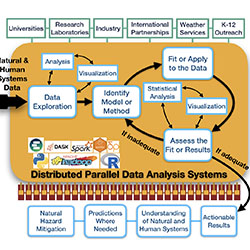Geodata Science Initiative

Solid-Earth & Planetary

Researchers develop and apply data science methods to large-scale problems in solid-earth geosciences and planetary science, including those of theoretical and applied geophysics, seismology, tectonophysics, surface processes, and energy science.
Atmospheric & Environmental

Researchers develop and apply advanced data science methods to areas of atmospheric and environmental sciences, including clouds and convection, Earth and climate systems, severe weather, subseasonal-to-seasonal prediction, geohydrology, and food-energy-water systems.
Transdisciplinary & Dynamic

Researchers from across campus conduct collaborative research in the nexus of weather, climate, environment, resources, energy, and society, supported by high performance computing clusters with GPU or Hadoop systems. Subgroups frequently reach out to public or private sectors and form international partnerships.
Becoming Engaged

Contact affiliated faculty directly for collaboration or research opportunities. Prospective graduate students can apply for PhD or thesis-based MS study in each affiliated faculty's EAPS subject area. Prospective MS students pursuing rigorous coursework and practical research toward industrial careers should apply for the Geodata Science for Professional (GDSP) MS program.
Geodata Science News
Climate change could expose up to 2.2 billion people in India and the Indus Valley: PNAS study
10-10-2023
TIMES INDIA — Climate change could expose up to 2.2 billion people in India and the Indus Valley to many hours of heat that surpass human tolerance by the end of the century, according to new research in Proceedings of the National Academy of Sciences (PNAS). This research is co-authored by Dr. Matthew Huber of Purdue EAPS. Huber is the David E. Ross Director of the Purdue Institute for a Sustainable Future.
These are the places that could become ‘unlivable’ as the Earth warms
10-10-2023
WASHINGTON POST — Heat waves can already be deadly for the most vulnerable people — but in a warming world, temperatures and humidity will, for growing stretches of every year, surpass a threshold that even young and healthy people could struggle to survive, according to new research published Monday. This research was co-authored by Dr. Matthew Huber of Purdue EAPS. Huber is the David E. Ross Director of the Purdue Institute for a Sustainable Future.
Deadly humid heat could hit billions, spread as far as US Midwest, study says
10-10-2023
REUTERS — Billions of people could struggle to survive in periods of deadly, humid heat within this century as temperatures rise, particularly in some of the world's largest cities, from Delhi to Shanghai, according to research published on Monday. This research was co-authored by Dr. Matthew Huber of Purdue EAPS. Huber is the David E. Ross Director of the Purdue Institute for a Sustainable Future.
Study: Climate change to drive temperatures too hot for humans
10-10-2023
AXIOS — Billions of people are at risk of temperatures exceeding survivability limits if global temperatures increase by 1°C (1.8°F) or more above current levels, a new study warns. Even young, healthy people could find it unbearably hot during part of the year, the study finds. The work of Dr. Matthew Huber, of Purdue EAPS, is cited in this article by Axios. Huber is the David E. Ross Director of the Purdue Institute for a Sustainable Future.
The Midwest US could be a hotspot for deadly ‘moist heat stress’ as global temperatures climb
10-10-2023
CNN — Large parts of the world, including China and the Midwest US, are on track to become too hot for humans to handle as accelerating global temperatures expose billions to heat and humidity so extreme their bodies will no longer be able to cope, according to a new study. Dr. Matthew Huber, of Purdue EAPS, is cited in this article by CNN. Huber is the David E. Ross Director of the Purdue Institute for a Sustainable Future.
Unbearable heat could make some parts of the world uninhabitable if warming continues
10-10-2023
EARTH.COM — Researchers from institutions including the Pennsylvania State University and Purdue University have recently found that if the Earth’s temperatures rise only one degree Celsius over current measurements, each year countless individuals will experience unbearable heat and humidity levels that will render their bodies incapable of cooling themselves. Moreover, the experts found that temperature increases of more than 1.5 C above pre-industrial times will result in significant negative impacts on human health worldwide.